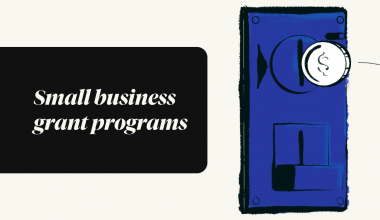Grants are funds awarded by private, public, and non-profit organizations for a variety of purposes. These organizations are often called funding agencies. All funders provide the money to achieve specific goals. These are payments that do not have to be repaid, as long as they are used for a specific purpose, as indicated in your application.
Grants are generally very competitive and require special skills to be completed effectively. They will always have a specific goal or theme, such as engaging young people, developing the arts, and even improving business and scientific research. Grants are always intended for independent projects with a clear start, end, and project results.
Choosing to apply to a funding organization requires you to research and assess whether your project matches the funding organization’s criteria and focus areas to be eligible.
In this article, you will learn about writing great funding applications, funding opportunities, and a lot more.
What is a Grant?
A grant is a cash award made by one entity (often a business, foundation, or government) to another in order to achieve a certain objective or to reward exceptional achievement. A grant is a form of financial aid that, in most cases, does not have to be repaid. Loans for higher learning, grants for scientific investigation, and stock options are all examples. Some grants require the recipient to wait (called “lock-up” or “vesting”) lengths of time before they may fully claim the award.
What are the 4 types of Grants for Non-profits?
- Competitive grant
- Continuation grant
- Pass-through grant
- Formula grant
What are Option Grants?
The term “grant” is commonly used in the business world to refer to the awarding of stock options in the company as a means of rewarding employees for their dedication to the company and their outstanding performance on the job. After a certain period of time has passed, the employee will be able to exercise their stock options and purchase shares at a price below the stock’s current market value. Occasionally, employees are awarded genuine shares of stock, which can be sold once a certain period of time has passed.
What is the Purpose of a Grant?
Grants are awarded to fund various federal domestic assistance programs, such as those involved in disaster relief, scientific exploration, and other areas of vital need (CFDA).
What are the Available Grants in U.S.A?
Grants in the United States
People in the United States looking for a government grant or loan may find the following resources useful:
- GovLoans.gov– This is a valuable resource for anyone looking for a government loan. It provides information on several loan types for education, housing, agriculture, business, and disaster assistance. It also contains information that is beneficial to veterans.
- CFDA (Catalog of Federal Domestic Assistance) – This website contains a comprehensive inventory of all US Federal programs available to state and local governments, as well as the District of Columbia.
- Funds.gov – This is for groups and states looking for grants.
Grant for College
Grants are one of the most desirable forms of financial aid used to pay for a college education. Experts generally say that the greater a student’s financial need, the more likely they are to receive a scholarship, but there are some things students can do to maximize the amount of money they receive.
Unlike student loans, which must be repaid, or co-op programs, which often require students to work on campus in order to earn money, scholarships are a form of financial aid that does not require reimbursement.
Students must fill out the Free Federal Student Aid Application in order to be eligible for most grants. The financial need represented through the FAFSA will help determine a student’s eligibility for a grant. The FAFSA is available on October 1 of each year and the federal deadline is June 30. Experts say the sooner a student submits to the FAFSA, the more opportunities they have for help. States have varying deadlines for FAFSA submission, often earlier than the federal deadline, so students should follow them to maximize grant opportunities.
Pell grants
The Pell Scholarship is the largest scholarship program offered by the United States Department of Education to undergraduate students. Low-income families can receive these federal grants by completing the FAFSA, which generates a number signifying the financial strength of the family called the Expected Family Contribution.
The amount of a student’s Pell scholarship depends on the CFE, the cost of attending the institution, the student’s status as part-time or full-time, and the expected duration of their participation.
Federal supplemental educational opportunity grant
The FSEOG is a federal grant aimed at helping undergraduates with significant financial needs, and it is often awarded to students who are eligible for the Pell Grant.
At participating schools, a student can receive between $100 and $4,000 a year in FSEOG money. The amount can depend on a number of factors such as the student’s financial need. Once a college runs out of its allotted FSEOG funding from the U.S.
Who is a Grant Writer?
A grant writer develops proposals for obtaining funding for nonprofit organizations. A grant writer contacts companies, businesses, or government agencies (donors or sponsors) that offer grants.
Most grant writers are employed by an organization and their goal is to help them apply and qualify for as many grants as possible.
Some responsibilities of a grant writer can be:
Grant Research: Grant research costs time, resources, and money, and grant writers have a responsibility to take the time to determine which grants are worth applying for.
Review Grant Guidelines: Many grants have specific qualification rules and writers should be aware of these requirements before writing proposals.
Creation of Proposals: Grantmakers must creatively explain why a company’s compelling causes, such as the environment or education, are important.
Communicate with clients and donors: Potential donors will have questions and a grant writer will need to answer questions and communicate with them regularly.
How to Become a Grant Writer
Here are the basic steps you may take to become a grant writer:
- Get an undergraduate degree.
- Learn how to write grant proposals.
- Gain experience.
Get an undergraduate degree:
A bachelor’s degree is required by employers for grant writing positions. Obtaining a bachelor’s degree will help you acquire the excellent grant writing skills you will need.
Learn how to write grant proposals:
Once you have completed your bachelor’s degree, you may want to hone your grant writing skills. You can do this by enrolling in an online certificate program for grant writing. Obtaining a certificate will help your resume stand out among employers. You can also choose to take an online course that will teach you how to write grant applications.
Many resources available online for writing grant proposals are free or inexpensive. For example, the American Grant Writer’s Association offers online courses in grant writing and counseling, as well as opportunities to get certified. These professional development courses and certifications will help you develop skills that you can immediately use in the grant writing arena.
Gain experience:
Most entry-level grant writing jobs require two years of experience. The best way to gain experience as a writer is to get a volunteer or internship opportunity. Many employers will want to hire someone who has experience in the industry for which they write grants.
Our article on how to become a grant writer will help educate you more
What are the Advantages and Disadvantages of Grants?
As good as Grants are, they sometimes have their ups and downs. Let us, therefore, discussthe pros and cons of Grants:
Pros
First, you don’t have to worry about finding a way to repay the money because it’s more or less a gift. Students who do not attend a certain number of classes or who drop out of a course may be required to repay the institution.
Secondly, your firm or organization will be under your complete control at all times. You won’t, for instance, have to sell shares in the company and thereby give up some control over the company.
Lastly, your credit history typically has no bearing on the outcome of your submission.
Cons
The three most significant drawbacks of grants are as follows:
First, it may not be simple to select one that is ideal for your needs.
Secondly, the competition for available grants is high since so many individuals, businesses, and other groups submit applications.
Third, grants rarely cover the total cost of a project. As a result, you’ll have to chip in some of your own cash.
Fourth, most funding opportunities are not given to those whose initiatives have already begun. Thus, if your project has already begun, you may choose to look for investors or lenders.
Finally, submitting a grant application can be a time-consuming ordeal.
What is a Grant Deed?
A grant deed is a legal document used to transfer ownership of real estate. The grantor is the person who transfers the property, and each grantor must sign the deed. The deed is an official document that indicates that a title has not already been granted to another person.
What is a Grant Deed in California
A California deed is a type of deed that transfers ownership from the previous owner to the new owner with a limited warranty of title. The title guarantee is limited in that it only covers the period during which the previous owner owned the property.
When the previous owner signs a deed of concession, he guarantees that he has done nothing that could cause title problems, but does not make any promises regarding the actions taken by the previous owners. The deeds of concession also convey the title acquired after the fact over California real estate.
What is a Grant from the Government?
A government grant is a financial award given by a federal, state, or local government authority for a beneficial project. It is actually a transfer payment.
Government grants are not only awarded: they must be applied for. Obtaining a government fund is an extremely competitive process. Crafting a compelling proposal is so difficult that applicants often hire professional help. Some freelance writers specialize in writing proposals.
What is a Grant Proposal?
Grant proposals are a type of business document that can be an important stepping stone for many organizations. Simply put, a grant proposal is an application from another organization, but the exact circumstances of each proposal will vary each time.
The Main Parts of a Grant Proposal are:
Abstract: This short summary, about half a page long, should clearly describe your proposed project, as a summary of a business plan.
Statement of needs: Describe the situation or problem that your proposal will address, including supporting evidence. You need to focus on the problem you hope to solve with the fund and argue that the problem can be fixed, that this is the right agency to address the problem, and that the problem is. large enough to justify the funding.
Project description: This part of the proposal describes the project and explains how it will solve the problem. It should convince the reader that your path is the best one.
Project Goals: This section should describe the desired outcome of your project.
Action plan: The action plan is a step-by-step description of the sequential activities that must be carried out to achieve the goals. It must clearly and specifically indicate who will do each step, what will be done and when. Evaluation. This describes how the project will be monitored and its results evaluated. It should cover the criteria for measuring progress, indicate who will conduct the assessments, and indicate when the assessments will be conducted.
Project Budget: This is where you indicate how you will use the money you receive. It should match the amount you are requesting, be realistic, and include only eligible expenses. Make it detailed enough to satisfy anyone’s curiosity about how the money will be spent, and make sure it all fits together.
Guide to Improve your Grant Success
To boost your chances of success, here are some tips that are applicable to any organization trying to gain a grant:
- Structure your proposal clearly to ensure that the reader can understand the contents and skim through easily.
- Research other grant application examples to get an idea of other people’s approach to proposal writing and what works.
- Ask questions about the grant to the granting body. This can really help you to look engaged with the project and give you valuable information that your competitors may have missed.
- Link back to the goals of the grant whenever you have the opportunity. This shows that your approach is targeted and stops you from straying from the topic at hand.
What Does Grant Mean in Money?
A grant is “free money” provided to someone who meets particular conditions or utilizes it to complete a certain goal. A loan, on the other hand, is a sum of money borrowed from an individual or organization in exchange for future payback plus interest.
Does Grant Mean Loan?
A loan requires repayment of the money borrowed, whereas a grant does not. Grants are, in essence, gifts. They are, in other words, non-repayable. Grants can be given to individuals, businesses, educational institutions, or non-profits by government departments, trusts, or corporations.
What Is the Purpose of a Grant?
A grant is a method by which the government finances your ideas and projects in order to deliver public services and stimulate the economy. Grants fund essential recovery initiatives, cutting-edge research, and a variety of other programs included in the Catalog of Federal Domestic Assistance (CFDA).
What Type of Money Is a Grant?
A grant is a type of financial aid that does not have to be repaid (unless you withdraw from school and owe a refund, or you receive a TEACH Grant but do not fulfill your service obligation).
Conclusion
When applying for a grant, be sure to present yourself as capable, informed, and forward-thinking. Establish your credibility by the thoroughness of your plan, the intentional way in which you present its importance and value, and the knowledge you have of what has already been learned or studied. Refer appropriately to any past accomplishments that confirm your ability to succeed and your commitment to this project. Describe the partnerships you have established with complementary organizations and individuals.
Related Topics
- Grant Management Software: Top 10 Options For Nonprofits
- Grant Writer Jobs: Best Options For Entry Level & Freelance (+ Free Tips)
- HOW TO BECOME A GRANT WRITER: Certificate Programs, Salary & Associations






